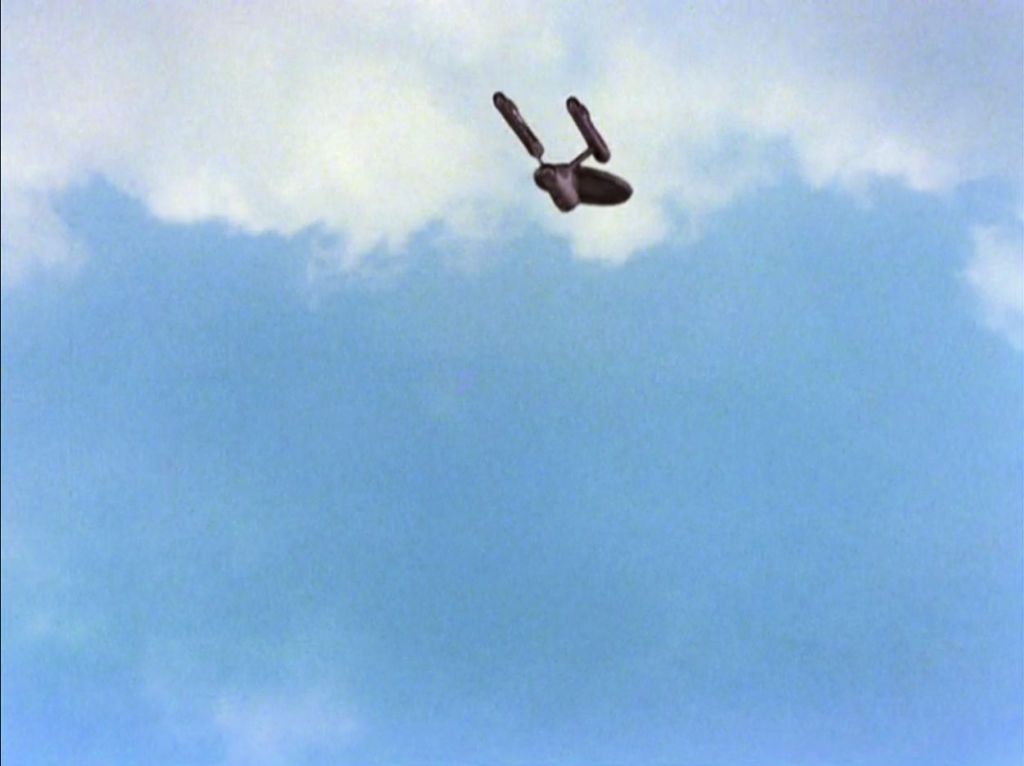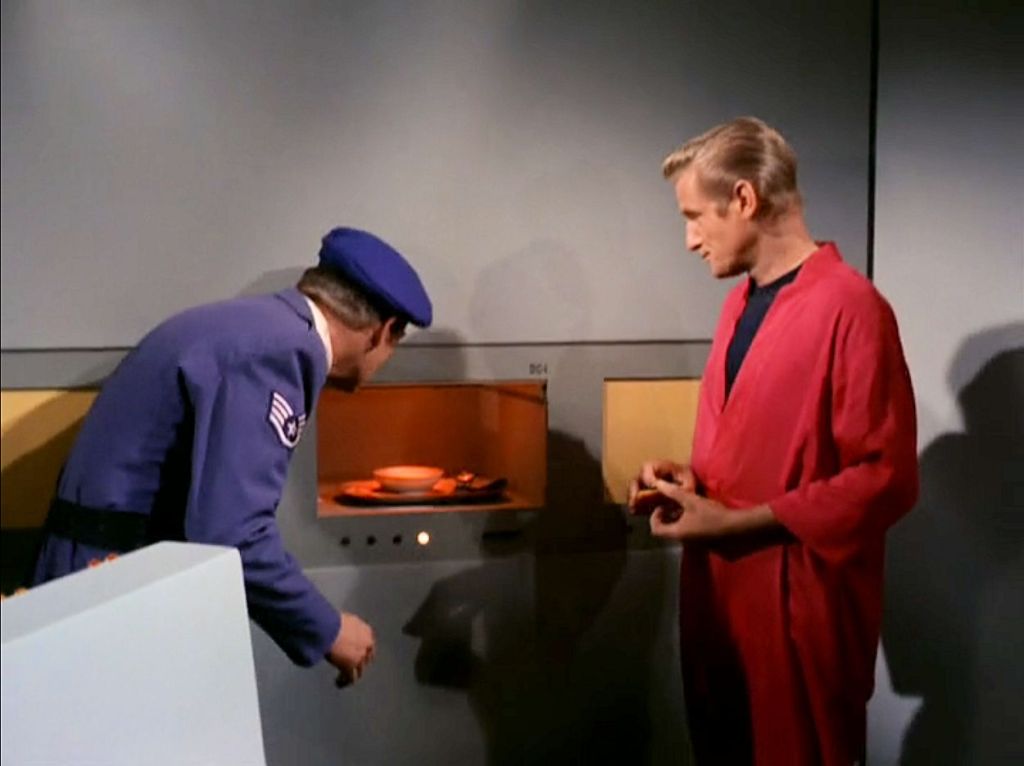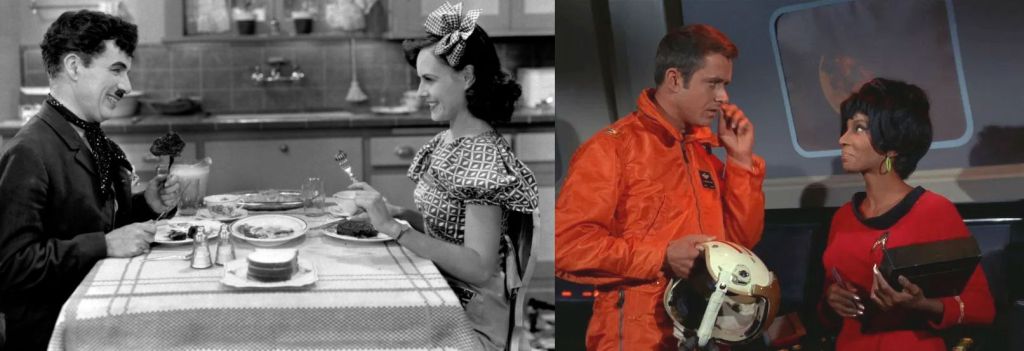(Note: If you haven’t read it yet, my introductory post on this Star Trek: The Original Series rewatch is a good place to start.)
Original Air Date: January 26, 1967
Crew Death Count: 0
Bellybuttons: 0
Remember “The Naked Time?” Sure you do. “The Naked Time” ended with the Enterprise accidentally traveling back in time three days by flying a high-speed “slingshot” maneuver around a star. “Tomorrow is Yesterday” recalls that effect when, in unseen backstory, a “black star” (which may or may not be a real thing) throws the Enterprise back in time to 1960s earth. Ending up at earth is an extraordinary coincidence, but here we are in Star Trek’s first real time travel episode and all the intellectual exercises associated with time travel. Troubles begin immediately, as the Enterprise is observed by a U.S. Air Force pilot who has to be beamed aboard before he can open fire on the “alien” ship, but then must be returned safely because his son will do important things, and…it’s all very complicated, but it makes perfect sense, honest, just trust me.

As always, our crew has a dazzling level of knowledge on 20th century earth history, so it’s convenient they ended up there. This is the first of numerous Star Trek time travel adventures that offer the characters’ perspectives on the timeframe, or approximate timeframe, in which the show was produced: later such jaunts will include Star Trek IV: The Voyage Home (1986), “Past Tense” in Deep Space Nine, “Carpenter Street” in Enterprise, and “Future’s End” in Voyager. The involvement of USAF also called to mind the short lived TV series Project U.F.O. (1978-1979), about two USAF officers assigned to investigate alleged UFO sightings.
“Tomorrow is Yesterday” has a strong “life first” element right from the start. Kirk first tries to capture the approaching jet rather than destroy it. When the Enterprise tractor beam overwhelms the jet, Kirk saves the pilot, Captain Christopher (Roger Perry), rather than let him die. The destruction of both the jet and the pilot would make our crew’s lives a lot easier, but when the needs of the one involve life and death, and the needs of the many involve abstract time travel conundrums, we can safely conclude that the needs of the one outweigh the needs of the many. McCoy also puts life first when he asks Kirk what will happen to the crew if they can’t return to the 23rd century: “That means 430 chances of altering the future.” We see a less obvious “life first” expression with the air base guard who is accidentally beamed on board the Enterprise. McCoy has the good sense to gently disarm him. He’s confined to the transporter room to minimize his exposure to 23rd century technology, but we’re not savages here, so the transporter chief kindly offers him something to eat.

The upbeat message is diluted a bit by Kirk’s negativity when faced with the prospect of taking Christopher back to the 23rd century: he concludes that Christopher would be “useless, archaic,” due to his lack of familiarity with all their whiz-bang, button-pushing technology. This is a conundrum faced by workers throughout the ages, and one of the great failures of the limited scope of “work” we have accepted since at least the dawn of the Industrial Age, an inequity expressed by Charlie Chaplin in his 1936 film Modern Times. Workers are forced into roles with increasingly limited transferability. One technology shift can leave employees obsolete and in need of additional education or training to keep up. We don’t need to worry much about Christopher; he demonstrates himself to be something of a 20th century Kirk, quick-thinking and resourceful. But here in our own time, rapidly changing technology and corporate greed have not only brought about widespread underemployment, but have also pushed many out of the job market entirely. These are contributing factors to depression, suicide, the opioid epidemic, and other social maladies.

The irony is that our Starfleet crew isn’t exactly working wonders with technology themselves. When Kirk declares that the Enterprise’s presence is an accident, Christopher agrees: “You seem to have a lot of them.” Imagine visitors from the future who are such bumblers that they accidentally crush a jet aircraft, are captured by air base security using only primitive weapons, and mistakenly conclude that their captive, Christopher, will make no “relevant contribution” to human history (it turns out his son will lead earth’s first Saturn probe, so Christopher needs to be returned, after all). The Enterprise’s usual lackluster security doesn’t help any, when Christopher easily wanders off, subdues a red-shirt, and obtains a phaser. Kirk clumsily exposes Christopher to more future technology than is necessary, actually enjoying showing off his ship, until Spock reminds him of the time travel conflict. Then there’s the Enterprise computer system, recently “upgraded” at the female-dominated Cygnet XIV (Why don’t we get an episode about that planet?!?) and now shirking its duties to flirt shamelessly with the captain. What good is all this technology if it’s put to such frivolous, even dangerous, use?

The question haunts us here in the 21st century. We like to imagine that someone from the past, dropped into our present time, would be dazzled by all of our gadgets and computing superiority. Would they, though? Would a craftsman or artist or deep thinker from past centuries see anything useful in Facebook, human-less tech support, or the latest craptastic Netflix series? We bankrupt ourselves for healthcare, invite Amazon drones into our living rooms, and dump our technological waste in landfills. How absurd this would all seem to anyone immersed in the real world of wood and stone, crops and soil, or books and conversation. If not laughable, it could well be traumatizing, as depicted in The Twilight Zone (1959-1964) episode “Execution,” where a bandit from the 1800s is overwhelmed by the relentless flashing lights, roaring automobiles, and blaring radios of a 1950s American city. Shoot-’em-up video games and Instagram don’t make us a superior species in any time period.
The entire episode is a people-over-technology metaphor. Even though our crew is saved by conducting the slingshot maneuver, it’s really their teamwork that saves the day. Everyone has a role to play. Uhura monitors obscure frequencies to establish the ship’s whereabouts. Sulu retrieves the troublesome film evidence at the Air Force base. Kirk unleashes Kirk-Fu moves on the air base security personnel so Sulu can escape. Scott repairs the engines before the crew becomes hopelessly mired in time-travel conundrums. McCoy reminds Kirk that people can adapt so maybe we shouldn’t give up on Christopher if he ends up stuck in the 23rd century. Spock completes the necessary calculations to get the crew home. We are never the sum of our tools, but succeed or fail based on our intellect, perseverance, and cooperation.

Ultimately, “Tomorrow is Yesterday” applies the Prime Directive to ourselves. It’s easy to treat non-interference as an abstraction applied only to others, a part-time principle we can use or discard according to circumstances. It’s human nature that we seldom care about principles until we’re directly affected. In speculating on the consequences of a non-interference failure, the episode illustrates our weaknesses and reminds us of our potential. Spock has certainly worked with humans enough to understand our limitations. When Christopher acknowledges, “You don’t trust me, Spock,” the first officer responds that he trusts Christopher “only to a certain point.” The harsh truth is that the historic record will offer the same calculation for most of us as it does for Captain Christopher – no achievements of lasting consequence. Doesn’t Christopher still deserve to live out his natural life? Don’t all of us? Yet the slightest disruption can change all of history. If Christopher’s son isn’t born, human space exploration, laying the groundwork for the Federation, will be forever altered. This also raises the distinction between interference and assistance. It’s relatively easy for the Enterprise crew to remain impartial because they live in humanity’s optimistic future. It’s a different matter for us here, at the time I’m writing this (late 2020), when we seem to have irrevocably sabotaged our own future. Imagine we really could travel back in time, what message would we have for our past selves? Could we convince ourselves of the urgency of climate change, or the lasting harm of income inequality? Given the chance, could we save ourselves?

We want to believe, and so did viewers in the 1960s, so “Tomorrow is Yesterday” delivers an extra dose of optimism. The episode confidently predicts a human lunar landing by “the late 1960s.” Despite President Kennedy’s 1962 challenge to land a man (that’s why Christopher is surprised to see a female crewmember on the Enterprise!) on the moon and return him safely to earth before the decade’s end, by January, 1967, a successful 1960s moon landing was not guaranteed. One day after “Tomorrow is Yesterday” first aired, astronauts Virgil “Gus” Grissom, Edward H. White, Jr., and Roger B. Chaffee, were killed when a fire broke out in their Apollo 1 capsule during a launch simulation at Cape Canaveral, Florida. The risks of exploration are very real and sometimes, unlike in television, our heroes don’t come home. Giant leaps sometimes result in tragic missteps. The Enterprise crew may be accident-prone, as Christopher claims, but they also remind us that they are explorers, and when danger is imminent, they will keep calm and carry on together. As Gus Grissom said in a 1966 interview, “There’s always a possibility that you can have a catastrophic failure, of course; this can happen on any flight; it can happen on the last one as well as the first one. So, you just plan as best you can to take care of all these eventualities, and you get a well-trained crew and you go fly.” It’s a degree of risk most of us aren’t cut out for, but we can still learn from their example. Instead of letting our emotions overwhelm us, when the unexpected occurs, we’ll need a calm unity to boldly go.

One final note of Trek trivia: When Kirk is captured on the air base, he’s interrogated by Colonel Fellini, played by veteran character actor Ed Peck. Peck later appeared in several episodes of Happy Days (1974-1984) as an over-zealous lawman named…Officer Kirk. This must mean something. One can only imagine what a Happy Days/science-fiction hybrid might look like…

Next: Court Martial